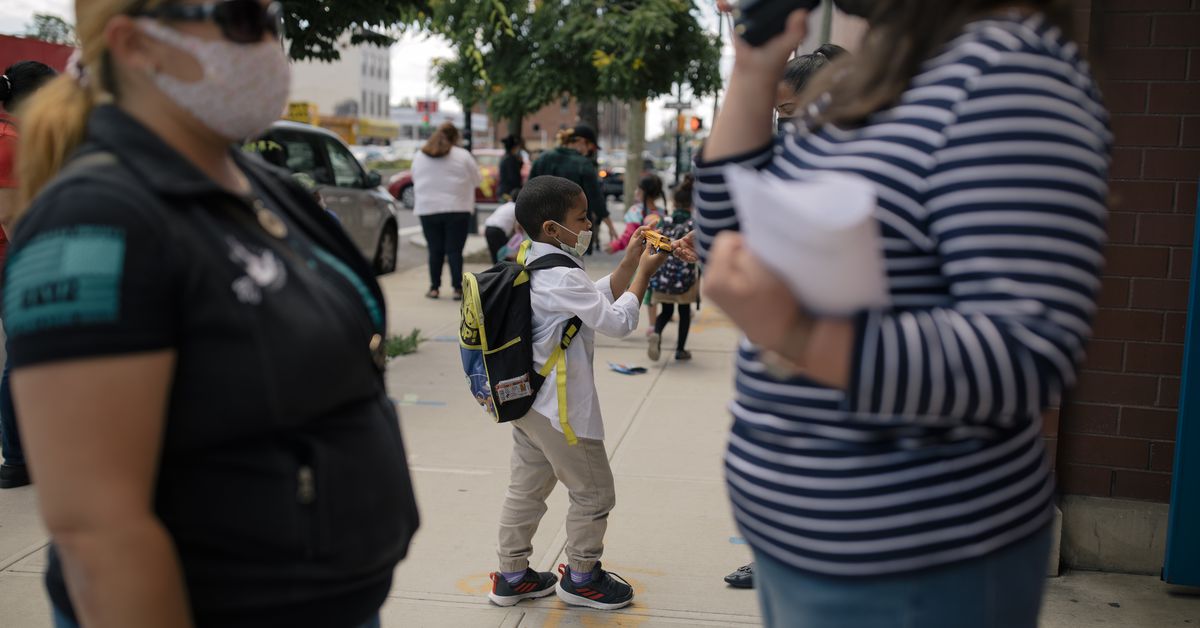NC K-12 education and the legislature during COVID-19
Second-grade teacher Kelly Hurry prepares for students to return to in-person instruction at Hortons Creek Elementary School in Cary Friday, Oct. 23, 2020. Some Wake County Elementary students will return the classroom on Monday for the first time since schools closed in March due to the coronavirus pandemic.
RALEIGH
The North Carolina General Assembly is coming back for its long session, when it decides the two-year state budget and key priorities, including one that has gotten more attention than ever amid COVID-19: education.
Some things are the same this time: the governor is still Democrat Roy Cooper, who was reelected in the fall. The state House and Senate are still Republican majority after the election, and have the same leadership, too, in Senate leader Phil Berger and House Speaker Tim Moore.
What’s different is how COVID-19 has changed everything about education in the past year, and what state lawmakers may end up doing about it.
“Schools, districts, and educators have had to change or adjust nearly every aspect of their work in the past year, and we will all look to legislators to provide the flexibility and resources to support the academic, social, and emotional learning and overall well-being of our students and staff in this COVID-19 transition and recovery period,” Mary Ann Wolf, executive director of the Public School Forum of North Carolina, said in a statement.
Helping students affected by the pandemic is a concern shared by groups across the political spectrum.
“There is no greater concern than addressing the needs of students who’ve fallen behind academically since the start of the pandemic,” Terry Stoops, director of the John Locke Foundation’s Center For Effective Education, said in an interview. “Addressing those needs may require additional funding for education and greater flexibility for districts.”
Where NC K-12 stands now
It has been 10 months since North Carolina public schools first closed due to the coronavirus pandemic. Most of the state’s K-12 students have been going to school from their homes, via their computer screens, ever since. In October, elementary schools were allowed to reopen for full-time, daily in-person instruction, but middle and high schools across the state are only allowed to open with restrictions that meant a hybrid mix of virtual and in-person education.
In the legislature’s short session in the spring of 2020, optimistic that COVID-19’s spread would be lessened, not worse, lawmakers passed bills that postponed testing, assessments and other rules.
Things have only gotten more challenging. State education leaders are warning that more students are failing their classes this school year, paving the way for a record number of children who could be required to repeat the grade level.
In a show of unity, new Republican Superintendent Catherine Truitt and the Democratic-majority on the State Board of Education say that more resources will be needed to help overcome the learning challenges. The board had clashed repeatedly with her predecessor, GOP Superintendent Mark Johnson.
The state board is working on its budget proposal. Chairman Eric Davis said that with so many education needs, the board needs to focus on those that can have the most impact.
“An excellent teacher in every classroom supported by a strong principal and superintendent leadership,” Davis said at last week’s meeting. “Everything else builds off that.”
Another concern raised by the state board is getting the legislature’s help to deal with a potential surge in kindergarten enrollment this fall. State K-12 enrollment dropped this school year, particularly in kindergarten, where parents may be waiting a year before enrolling their children.
Wolf, of the Public School Forum, said lawmakers can help districts by providing them adequate and equitable funding and calendar flexibility. She said those steps can help address issues such as recruiting and retaining a diverse teacher workforce, expanding access to broadband and developing expanded and flexible learning opportunities for students.
Teacher raises and bonuses
The 2019 budget battle between Cooper and Democrats in the legislature vs. the Republican majorities in both the House and Senate centered on two big topics: Medicaid expansion and teacher raises. The House overrode Cooper’s veto of the budget in September 2019, but the Senate never called for an override vote. Now, like then, each chamber has a Republican majority but not the supermajority needed to override a veto going by party affiliation alone.
As the 2019 budget fight dragged out into fall 2019, Cooper and Republican leaders never agreed on an amount for teacher raises. Finally in a one-day session in January 2020, lawmakers sent Cooper a teacher raises bill, but the governor vetoed it for raises being too small and an override failed. After COVID-19 hit, lawmakers passed a bill giving teachers a one-time $350 bonus and step-raise increases, which Cooper signed into law. Those bonuses were distributed this past fall.
Cooper told The News & Observer in an interview this past week that educator pay is one area he’d like to find common ground on with Republican leaders in the General Assembly this session.
“I think both sides realize that last year on the budget was not positive,” Cooper said.
“I think we’ve had very good conversations since the elections about the fact that the people have spoken and want to continue divided government in North Carolina, and so we owe it to them to work hard to find common ground. Educator pay is one of those areas we really want to do that,” he said.
Cooper said he hopes that will mean both one-time bonuses and long-term pay raises to keep the good educators North Carolina already has and to attract more to the system.
Schools and COVID-19
Before and after Cooper allowed elementary schools to reopen full-time in October, Republican lawmakers have pushed for giving parents the option of having their students in K-12 schools for in-person instruction. In Wake County, the largest school system in the state, parents can choose an all-virtual option or in-person, which is full-time for elementary and on a three-week rotation for middle and high schools starting second semester.
In a November interview with The N&O, Senate leader Phil Berger said that he still supports giving all K-12 students the option of full-time in-person instruction. He questioned damage to students from not being at school, including learning gaps.
He said just like other public workplaces like businesses, there are safety measures in place like Plexiglas and everyone wearing masks.
“I don’t understand why the schools can’t do the same things,” Berger said. He said he would consider funding if there is a need.
“I think that there is a way for the schools to be opened with appropriate protocols,” he said, to lessen the spread of COVID-19. “We shouldn’t shut down the entirety of the education system because some folks might catch the virus.”
The prolonged absence from in-person learning will impede both the ability of individual students and the states to be as successful as they can be, according to Berger.
Both Berger and Davis, the state board chairman, agree that the state needs to focus more on improving how it teaches reading to students.
School funding during pandemic
One of the questions this session is how much state funding lawmakers will provide to help accomplish goals such as improving literacy for students.
Congress recently approved a new coronavirus relief package that could provide $1.6 billion for the state’s K-12 public schools.
“These funds cannot be used to subsume funding that should come from the states,” state board vice chairman Alan Duncan said at last week’s meeting. “The state needs to maintain its normal funding flow for education. These funds are intended purely to be supplemental from the federal government.”
The amount of state revenue available could cap what lawmakers do this year for education, especially if collections are down, according to Stoops of the Locke Foundation. With so much at stake for the state’s students, Stoops said he hopes a unified strategy can be developed.
“My hope is that the General Assembly agrees to a budget fairly quickly, that there is ample agreement to the approach that the state needs to take to address the problems created by the pandemic,” Stoops said. “I don’t think anyone in this state wants a prolonged budget battle with public rancor.
“There is right now a mood where people want to see both sides work together to solve the problem.”
For more North Carolina government and politics news, listen to the Domecast politics podcast from The News & Observer and the NC Insider. You can find it on Megaphone, Apple Podcasts, iHeartRadio, Stitcher or wherever you get your podcasts.







